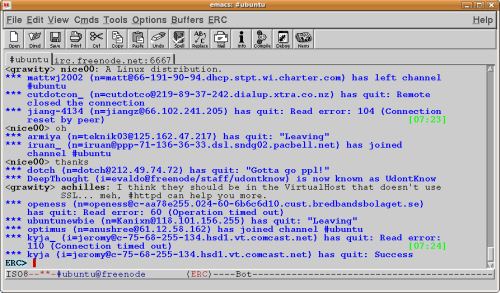ERC is a powerful, modular, and extensible IRC client for Emacs. It supports multiple channel-buffers, nick completion, keyword highlighting, and more.
The software is written in Emacs Lisp. This makes it very easy to extend, customise and adapt ERC to your own personal style. A useful feature of ERC is that you can extend the set of commands available on your IRC prompt by writing your own short Emacs Lisp functions.
ERC maintains a separate buffer for each open IRC channel and direct conversation. A sophisticated mechanism is used to indicate activity in currently hidden buffers in the mode-line, called Channel Tracking.
Features include:
- Works with both Emacs and XEmacs.
- Multi channels / multi servers: every channel is put in a separate buffer; several IRC servers can be used simultaneously.
- Queries: private conversations are treated as channels, and are put into private buffers.
- Flood control.
- Timestamps.
- Join channels automatically.
- Buttonize URLs, nicknames, and other text.
- Wrap long lines.
- Highlight or remove IRC control characters.
- Highlight pals, fools, and other keywords.
- Detect netsplits.
- Complete nicknames and commands in a programmable fashion.
- Make displayed lines read-only.
- Input history.
- Track channel activity in the mode-line.
- Highlighting: some occurrences of words can be highlighted, therefore easing conversation tracking.
- Notification: ERC can notify you that users are online.
- Channel tracking: channels can be hidden and conversation continue in the background. You are notified when something is said in such a hidden channel.
- Nick completion: ERC can complete words so as to ease the writing of nicknames.
- History: past actions are kept in history rings for future use.
- Multi languages: messages are multilingual and can be customized.
- User scripting: users can load scripts (e.g. auto greeting scripts) at ERC startup.
Website: www.emacswiki.org/emacs/ERC
Support: Manual
Developer: Gergely Nagy, Adrian Aichner, Andreas Fuchs, Benjamin Drieu, and many others
License: GNU General Public License v3.0

Return to Console Based IRC Clients
| Popular series | |
|---|---|
| The largest compilation of the best free and open source software in the universe. Each article is supplied with a legendary ratings chart helping you to make informed decisions. | |
| Hundreds of in-depth reviews offering our unbiased and expert opinion on software. We offer helpful and impartial information. | |
| The Big List of Active Linux Distros is a large compilation of actively developed Linux distributions. | |
| Replace proprietary software with open source alternatives: Google, Microsoft, Apple, Adobe, IBM, Autodesk, Oracle, Atlassian, Corel, Cisco, Intuit, SAS, Progress, Salesforce, and Citrix | |
| Awesome Free Linux Games Tools showcases a series of tools that making gaming on Linux a more pleasurable experience. This is a new series. | |
| Machine Learning explores practical applications of machine learning and deep learning from a Linux perspective. We've written reviews of more than 40 self-hosted apps. All are free and open source. | |
| New to Linux? Read our Linux for Starters series. We start right at the basics and teach you everything you need to know to get started with Linux. | |
| Alternatives to popular CLI tools showcases essential tools that are modern replacements for core Linux utilities. | |
| Essential Linux system tools focuses on small, indispensable utilities, useful for system administrators as well as regular users. | |
| Linux utilities to maximise your productivity. Small, indispensable tools, useful for anyone running a Linux machine. | |
| Surveys popular streaming services from a Linux perspective: Amazon Music Unlimited, Myuzi, Spotify, Deezer, Tidal. | |
| Saving Money with Linux looks at how you can reduce your energy bills running Linux. | |
| Home computers became commonplace in the 1980s. Emulate home computers including the Commodore 64, Amiga, Atari ST, ZX81, Amstrad CPC, and ZX Spectrum. | |
| Now and Then examines how promising open source software fared over the years. It can be a bumpy ride. | |
| Linux at Home looks at a range of home activities where Linux can play its part, making the most of our time at home, keeping active and engaged. | |
| Linux Candy reveals the lighter side of Linux. Have some fun and escape from the daily drudgery. | |
| Getting Started with Docker helps you master Docker, a set of platform as a service products that delivers software in packages called containers. | |
| Best Free Android Apps. We showcase free Android apps that are definitely worth downloading. There's a strict eligibility criteria for inclusion in this series. | |
| These best free books accelerate your learning of every programming language. Learn a new language today! | |
| These free tutorials offer the perfect tonic to our free programming books series. | |
| Linux Around The World showcases usergroups that are relevant to Linux enthusiasts. Great ways to meet up with fellow enthusiasts. | |
| Stars and Stripes is an occasional series looking at the impact of Linux in the USA. | |